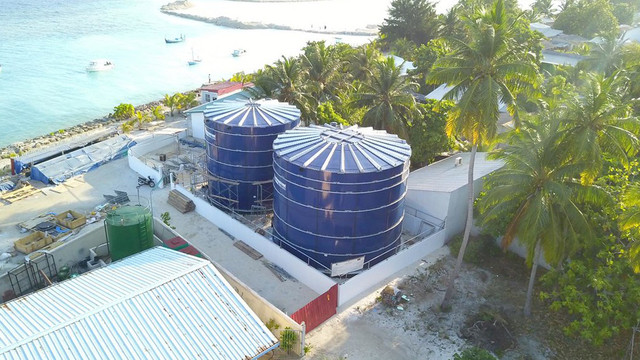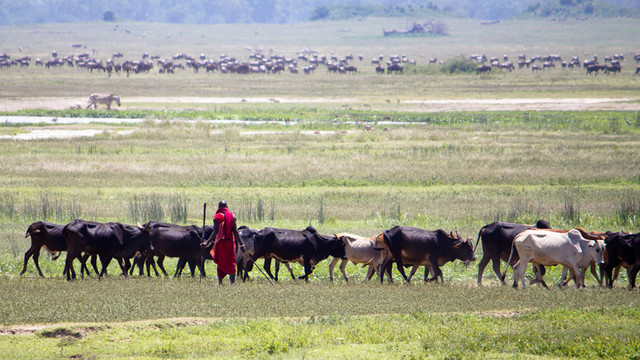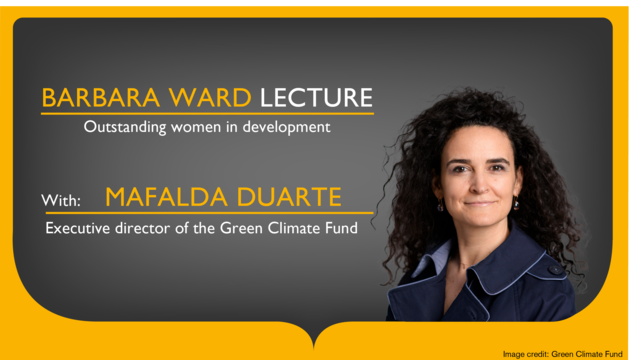COP21 side event discusses how to unlock climate finance for developing countries
IIED and the African Climate Policy Centre (ACPC) co-hosted a panel discussion on how poor countries can best access climate finance.

The event was held in the Africa pavilion at the Paris climate summit (Photo: IIED)
The meeting on 1 December was a side event at the Paris climate summit (COP21). It focused on how developing countries could access financial mechanisms to help them meet the twin challenges of climate change and sustainable development.
Organisers said the Sustainable Development Goals and the climate targets due to be set in Paris would only be reached if the world's poorest people were able to access the finance they need. Policy debates tended to focus on where money would come from: a key question was how to get funds to the poor countries which need it most.
The meeting was opened by the chair of the Least Developed Countries (LDC) Group, Giza Gaspar-Martins of Angola. In his statement he highlighted recent research by IIED that estimates that the cost of all 48 LDCs implementing their post-2020 climate action plans would be around US$93 billion per year.
IIED senior researcher Neha Rai said that from of the $40 billion dollars of climate finance provided to developing countries each year, only a third had made it to the Least Developed Countries (LDCs), whereas 70 per cent had gone to middle income countries.
Rai said the reason money was not going to the poor was that poor countries had specific financial needs and required specific types of financial instruments and inclusive intermediaries to manage the funds. Rai has recently published a blog looking how to get GCF funds distributed at a local level.
The director of the European Capacity Building Initiative, Benito Müller, said devolution to the local decision-making level was a key way to enhance direct access to the Green Climate Fund's (GCF) resources. He said countries should test their existing financial transfer mechanisms, such as development banks, to see which ones were most effective at reaching local communities. He stressed the importance of local access, noting that local people and small enterprises will "go to local banks for funding, not to Songdo" (the headquarters of the GCF).
This session used case studies from Africa and Asia to illustrate how policymakers are unlocking public-private flows for inclusive investment in low carbon resilience development.
Local finance in Kenya
Victor Orindi from Kenya's National Disaster Management Authority described a project to help five counties access climate finance. To ensure that the money reaches local communities, the project's County Climate Change Fund has a devolved governance system that prioritises local communities' funding wishes.
. @Vorindi on #Kenya's county adaptation fund to deliver #climatefinance to the local level @IIED @DFID_UK #COP21 pic.twitter.com/YwJW3NRJtq
— Nanki Kaur (@nankimann) December 1, 2015
Orindi reported that the project found that investing in processes that build the capacity of communities and local governments to engage with each other takes time and resources – but was a critical task and delivered a more lasting positive change.
IIED is supporting work to set up decentralised climate adaptation funds in Kenya and Tanzania, and Mali and Senegal.
Funding renewables in Nepal
Raju Pandit Chhetri, of the Prakriti Resources Centre in Nepal, spoke about Nepal's priority for funding renewable energy. He outlined Nepal's five-year National Rural Renewable Energy Program, costing $170 million, which splits financing 50/50 between the government of Nepal and donors.
He outlined the challenges faced by the project, including:
- Renewable energy as a new sector needing greater support and incentives
- The difficult geography of Nepal
- Administrative burdens, and
- Renewable energy not being seen as profitable to the private sector.
Lack of capacity building makes collaboration vital
The meeting was moderated by IIED senior fellow Saleemul Huq. Huq who is also director of the International Centre for Climate Change and Development (ICCCAD) in Bangladesh, criticised the level of capacity building support to help countries access the GCF. He said that to address the problem of inadequate support for capacity building, Bangladesh officials had visited and learned from a Senegalese organisation that was the first organisation to be accredited to both the Adaptation Fund and the GCF.
Huq said that this type of South-South collaboration would crucial in learning how to access climate finance.
The meeting ended with a discussion session at which the panel and audience focused on a number of questions relating to access to the GCF, the split between government and donor funding, and community participation. The session was followed by a reception.
This report was compiled with assistance from the International Institute for Sustainable Development.
Related publications
IIED has produced a series of publications looking access to development and climate finance:
A fair climate deal in Paris means adequate finance to deliver INDCs in LDCs, Neha Rai, Marek Soanes, Andrew Norton, Simon Anderson, Paul Steele, Janna Tenzing, James MacGregor (2015), IIED Briefing paper
Delivering climate and development finance to the poorest: intermediaries that 'leave no-one behind', Paul Steele, Neha Rai, Anna Walnycki, Isilda Nhantumbo (2015), IIED Briefing paper
Beyond loans: instruments to ensure the poor access climate and development finance, Paul Steele, Neha Rai, Isilda Nhantumbo (2015), IIED Briefing paper
Climate adaptation funds, Ced Hesse (2015), IIED Backgrounder
Ten principles to help assess funding for local climate adaptation, Adrian Fenton, Hannah Reid, Helena Wright, Saleemul Huq (2015), IIED Briefing paper
Financing inclusive low carbon resilience development in Bangladesh and Nepal, Jony Mainaly (2015), IIED Report


